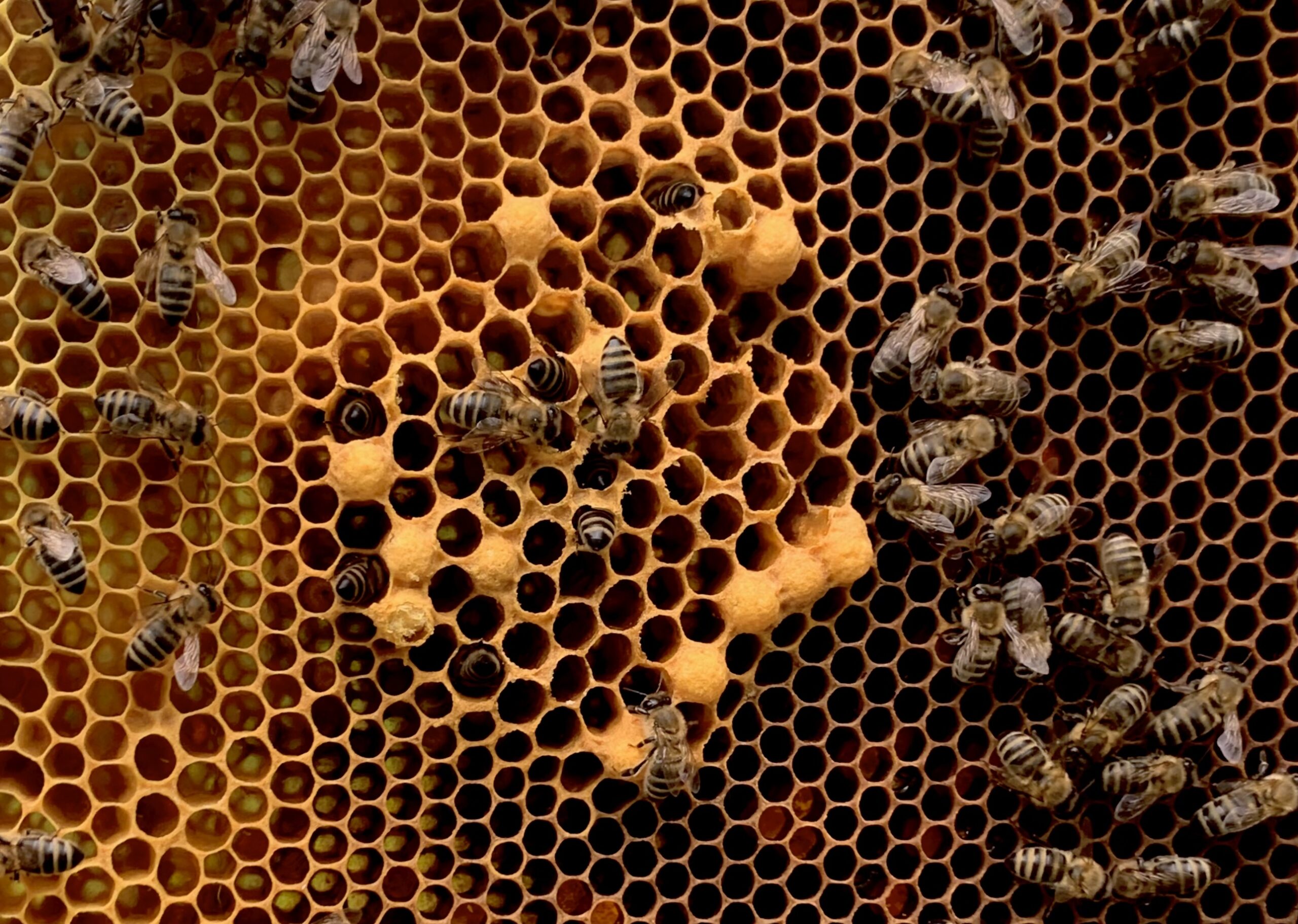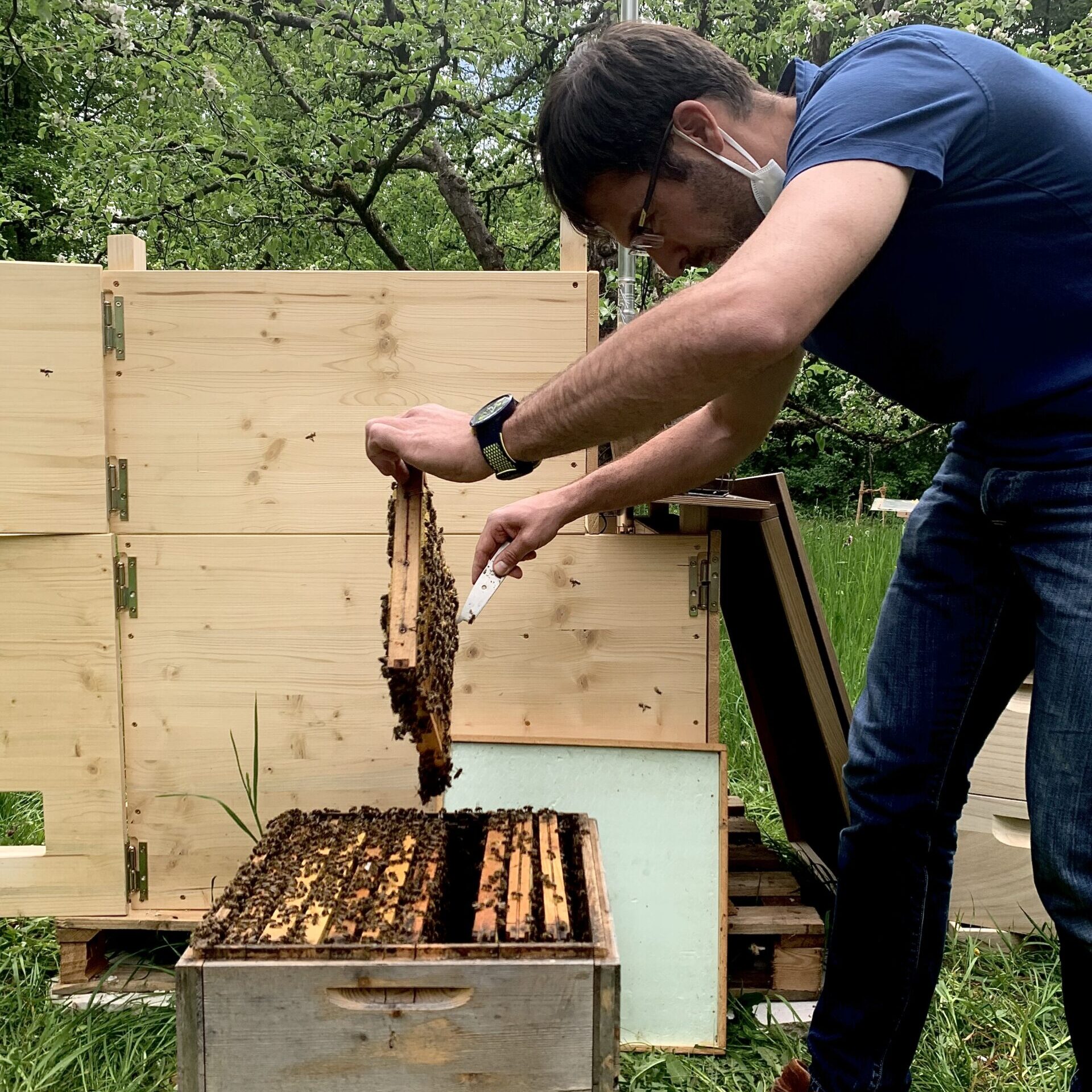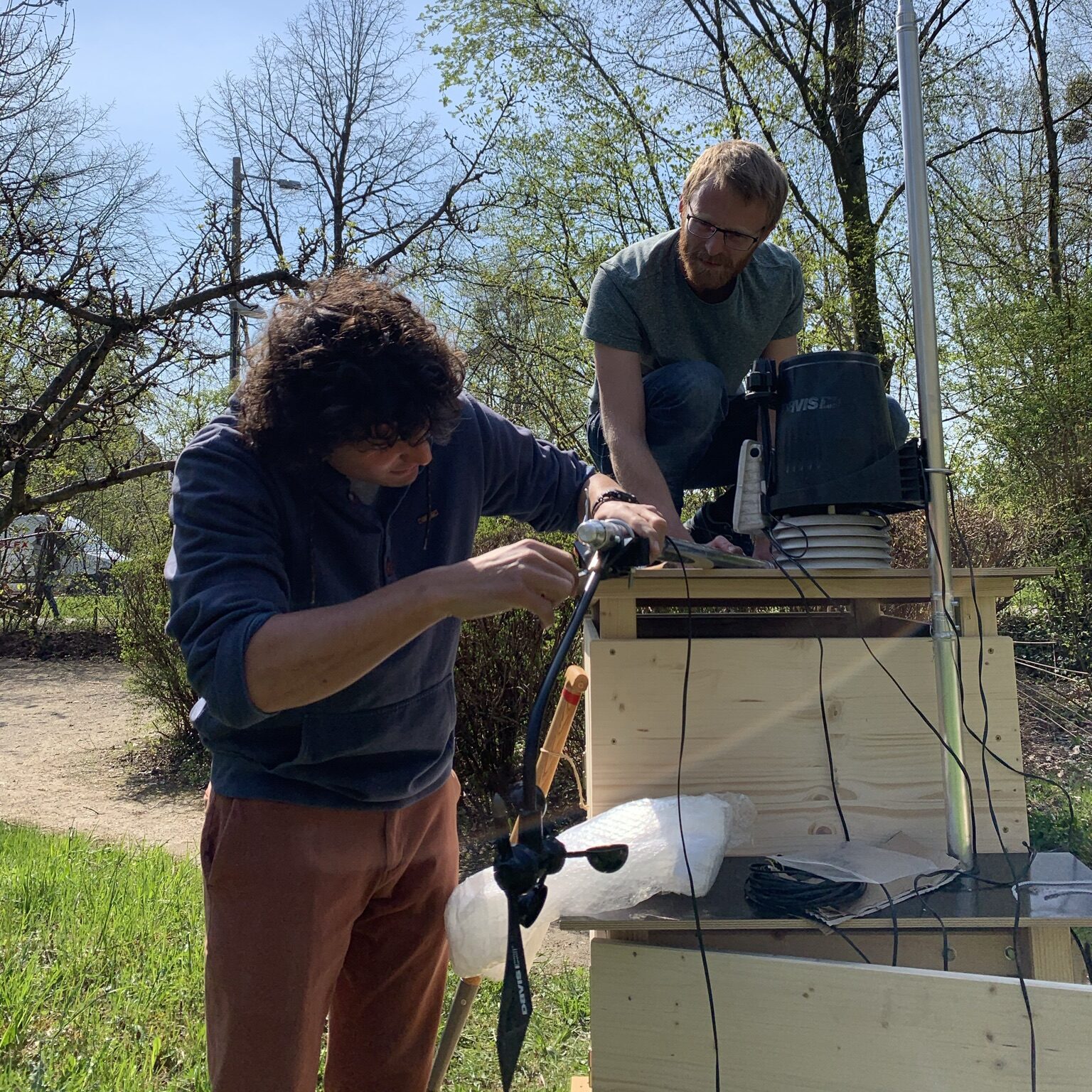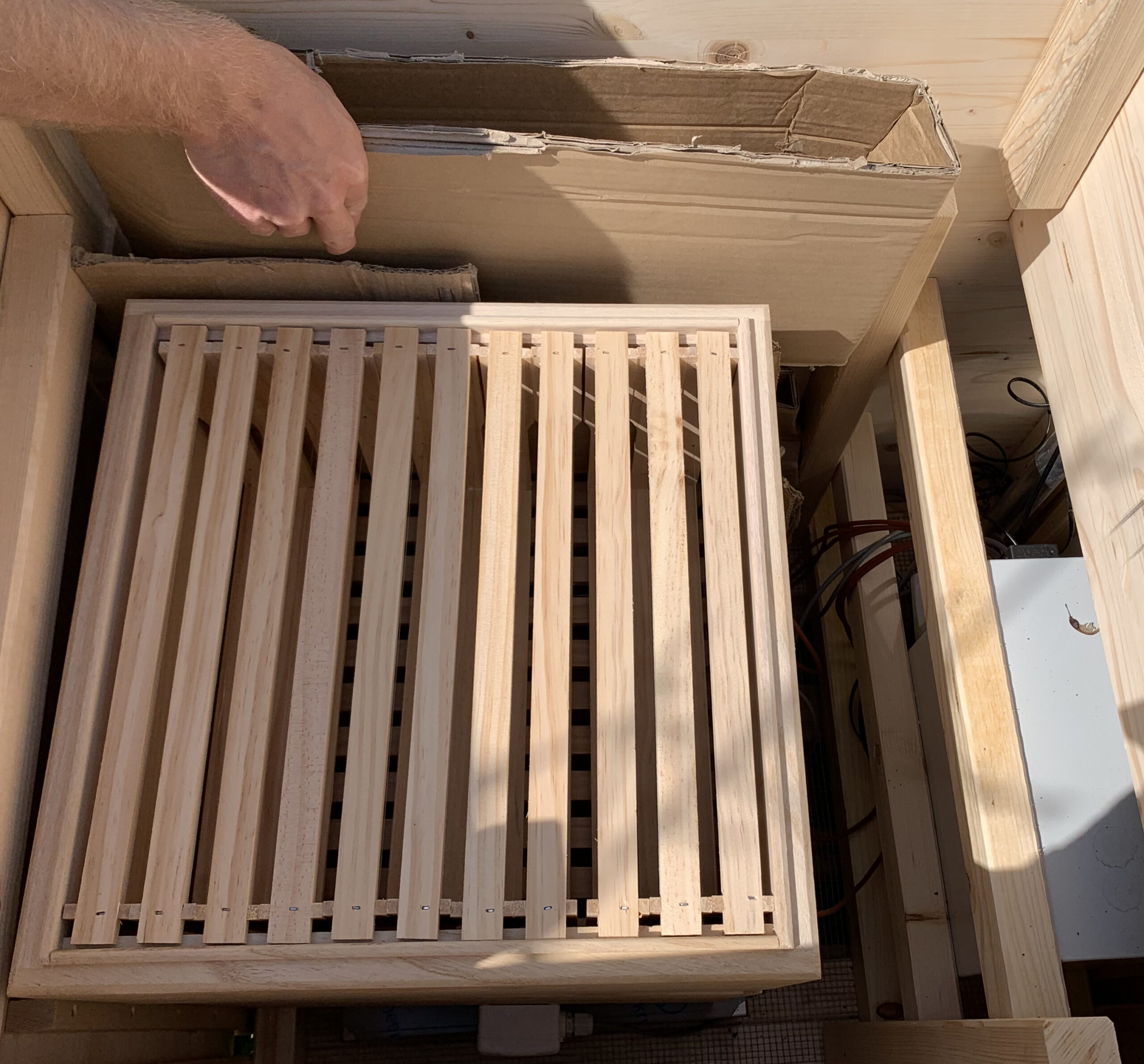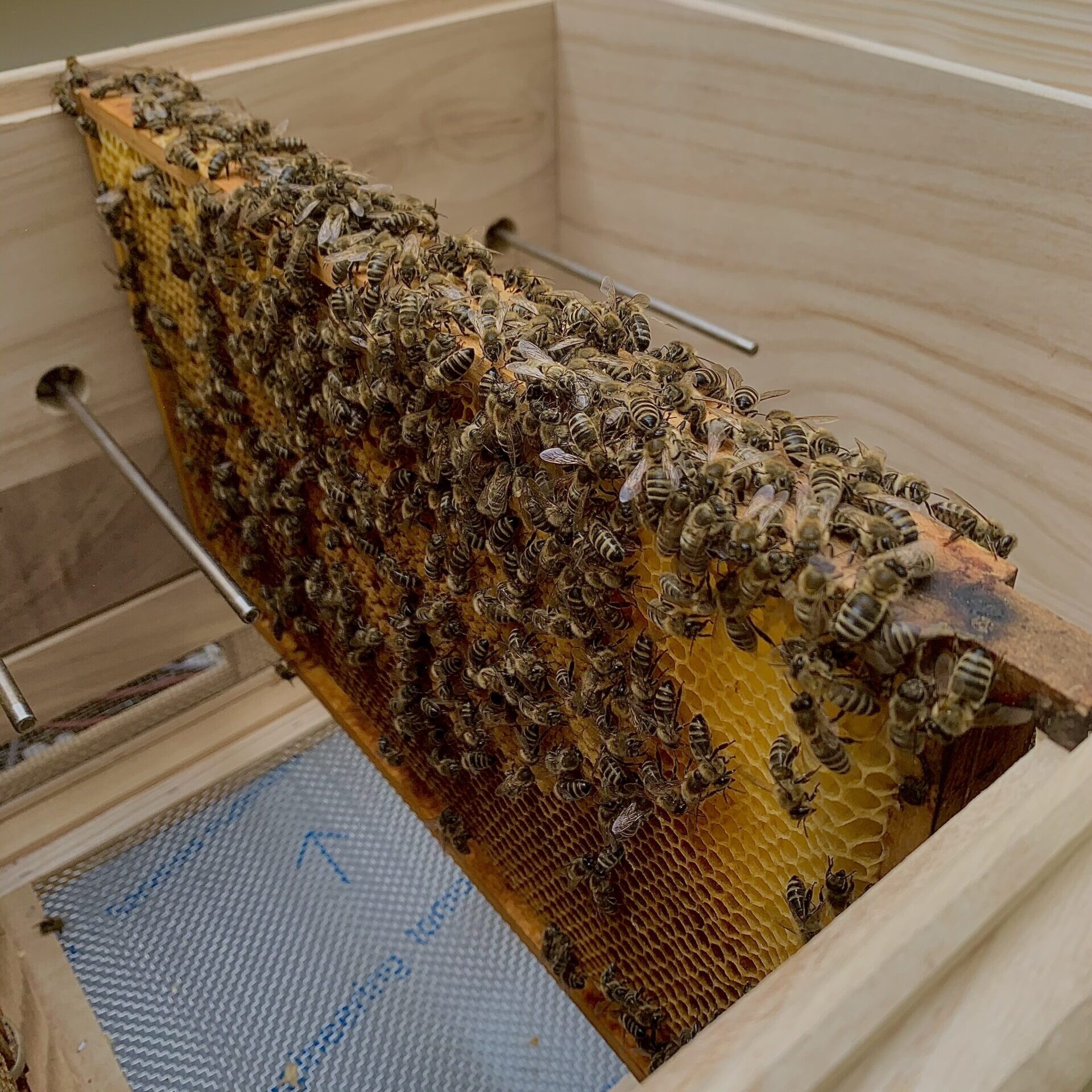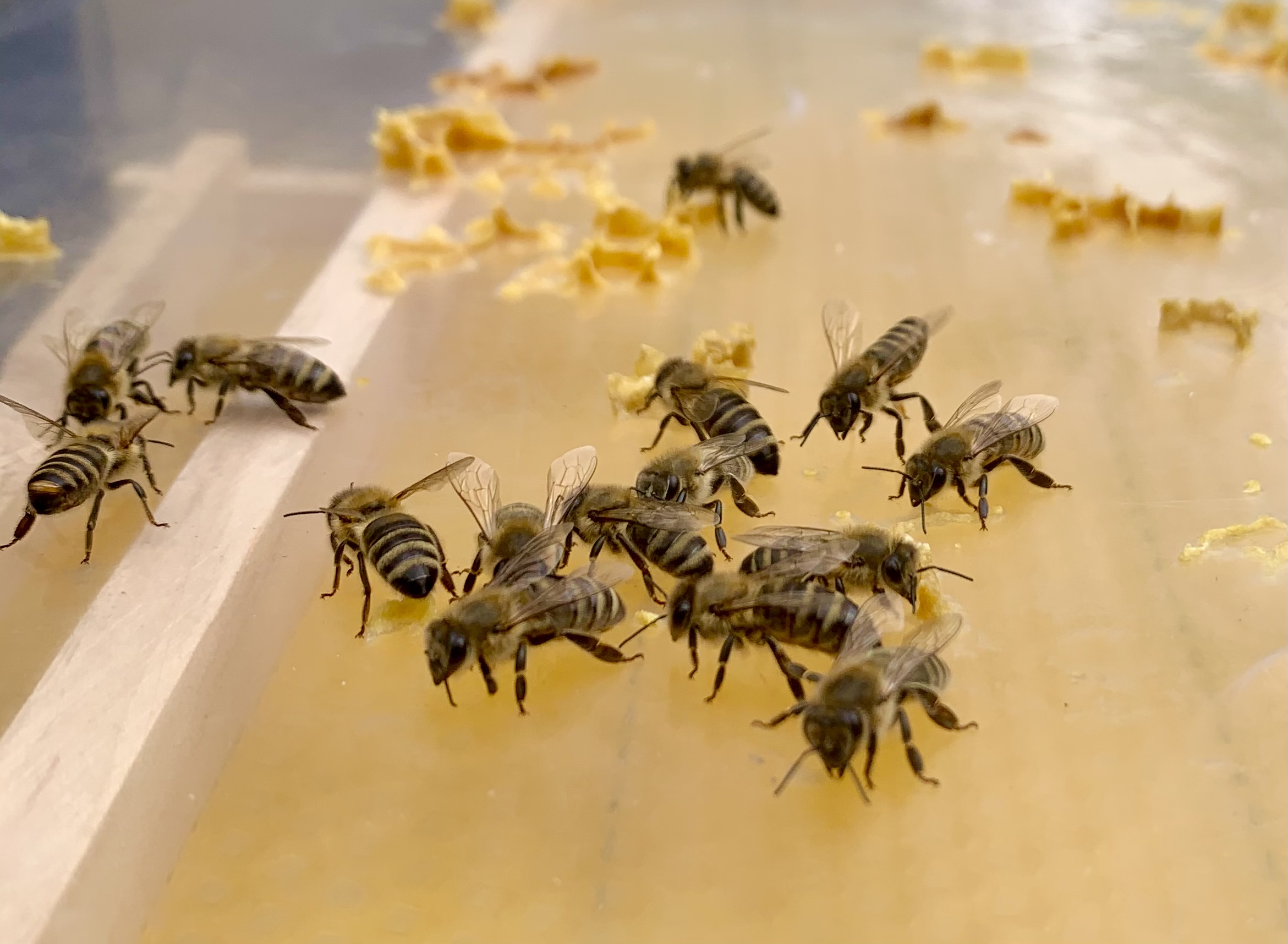Research Archive
2016-2022
EU-Project
Differentiation in IBL (DifferentiaInq) Research and Development of Differentiation Concepts in Inquiry-Based Learning
Project Lead (PLUS): Assoc. Prof. Priv.-Doz. MMag. Dr. Iris Schiffl You can find more information about the project here >>
2021
Projekt bee.digital
The Salzburg eHive of the Biology Education Research Group has been installed in the Botanical Garden and will go online shortly! This beehive is equipped with numerous sensors: temperature sensors, humidity sensor, scale, and a weather station (measuring outside temperature, humidity, precipitation, wind speed, wind direction, solar radiation, barometric pressure, and UV index). The measurement data can be viewed live online and is stored over long periods. The eHive enables in-depth investigation of various topics—for example, how honeybees regulate temperature within the hive. The eHive was installed as part of the Salzburg education lab project bee.digital. The bee.digital project integrates three core themes of biology and media education:
- Inquiry-based learning as a central scientific competence in the process of knowledge acquisition,
- The honeybee as a fascinating superorganism, and
- The educational use of digital media.
Teacher training sessions and student courses are planned to explore these themes and their practical applications. In addition to directly observing and studying the honeybees, learners are introduced to the eHive and the associated BeeBIT website. By combining digital data acquisition with on-site observation of living organisms (primary and secondary experience), valuable synergistic learning effects can emerge.
For more information on bee.digital, please contact: .
The non-profit association BeeBIT e.V. manages electronically monitored beehives—called eHives—throughout Europe. These hives collect internal hive data such as temperature and humidity, monitor the hive’s weight, and, through an external weather station, record environmental conditions such as temperature, solar radiation, precipitation, and wind.
Project Lead: Lena von Kotzebue Project Team: Lisa Virtbauer, Ines Deib, and Stefan Mayr
Impressions of the Setup and Arrival
Research Project
2017-2018
Bee a Scientist
What the title promises, our project has been delivering for over two years now. School students can experience honeybees up close at the University of Salzburg’s observation hive, conduct their own investigations, and in doing so, not only gain knowledge about honeybees but also learn how scientists work. The project will continue in summer 2019, and school classes can now register to participate.
Project Team
- Mag. Dr. Lisa Virtbauer (Project Leader, Senior Scientist, Department of Science Education)
- Dr. Ines Deibl, MAv (Project Leader)
- Freya Hutter, BA B.Ed.Univ. (Student Assistant, Project Coordination, Registration & Information)
For Teachers, Students, and the Curious You can find the full project description and photos as a PDF.
Awards →
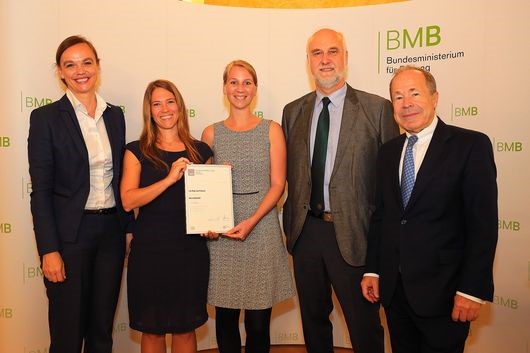
“Bee a Scientist” Wins First Prize
On October 18, 2016, the B&C Private Foundation honored outstanding projects in science communication at Austrian educational institutions. Out of 113 submissions, Lisa Virtbauer and Ines Deibl from the School of Education at the University of Salzburg, Department of Science Education, together with Stephanie Moser from the TUM School of Education in Munich and Stefan Mayr from Werkschulheim Felbertal, were awarded first prize (15,000 euros) for their project “Bee a Scientist.”
The aim of the project is to help children and young people understand the vital role bees play in preserving our ecosystems. It also strives to reduce fear and negative experiences associated with bees. The ultimate goal is to foster positive attitudes and improve knowledge about honeybees and their way of life.
Project Developers: Lisa Virtbauer and Ines Deibl, School of Education, University of Salzburg
Subject Area: Natural Sciences (Biology and Environmental Studies, Physics) Target Group: Lower and upper secondary schools (ISCED Level 2)
Age Group: 11–15 years
Project Summary: Bees are essential to the preservation of our ecosystems. However, many children and adolescents associate these animals with fear and negative experiences. To counteract this, the project aims to promote positive attitudes and enhance knowledge about honeybees and their way of life. The core of the program consists of seven research questions, which students explore using a structured guide and a bee observation hive.
Project Information: This school and research project is designed to improve students’ understanding of honeybees and foster a more positive attitude toward them. Through inquiry-based learning and by working directly with living organisms, students develop in-depth knowledge of honeybee behavior and biology. Observing live bees is most effective in and around their hive—ideally via a bee observation hive. A great example of this is the Botanical Garden at the University of Salzburg, where regular visits are possible. Hands-on engagement with live bees has been shown to increase student interest and motivation. Direct interaction can lead to positive shifts in perception. Students are guided by a research framework and tackle seven key questions while working at the observation hive. To assess the impact of the project, a pre/post questionnaire is used to measure any change in attitudes or knowledge.
→ [Original article at the B&C Private Foundation] → [Project poster by the developers]
Reflections and Impressions 2017/2018
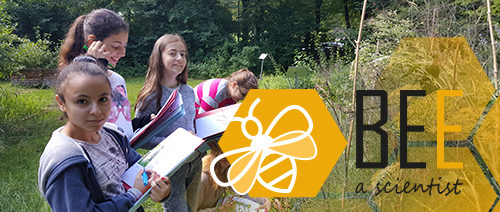
Here you can gain insight into past project implementations:
- “Bee a Scientist” 2017
- “Bee a Scientist” 2018
- “Bee a Scientist” 2018 with Class 2c of Ursulinen Gymnasium Salzburg
- School Beekeeping Project & “Bee a Scientist” 2017 (Werkschulheim Felbertal)
Educational Standards in the Natural Sciences
The development of educational standards for natural science subjects began in 2005 at higher vocational schools (BHS). Under the direction of the Austrian Federal Ministry for Education, Arts and Culture (Department II), working groups consisting of experienced teachers and university-based subject didactics experts were established. The implementation occurred in two phases: In Phase 1, competence models were developed; in Phase 2, prototypical classroom tasks were designed (see Educational Standards). For lower secondary schools (Hauptschule/New Secondary School) and general academic secondary schools (AHS), the development of educational standards in the natural sciences began in 2007. Commissioned by the Federal Institute for Educational Research, Innovation and Development of the Austrian School System (BIFIE), a team of teachers and university science education researchers (project lead: H. Weiglhofer, University of Salzburg) created a competence model (see below) as a first step. Prototype tasks were developed to help teachers implement the standards in practice. To better structure the development of competencies, BIFIE developed a platform for informal competence assessment (IKM). In the field of biology, the School of Education (I. Schiffl, H. Weiglhofer) played a key role in the design and development of tasks. As part of the competency-based final exam reform aligned with the educational standards, a working group under the direction of the Austrian Federal Ministry of Education and Research (BMBF) developed a competency model and sample tasks for biology (subject-didactic design: H. Weiglhofer; see Competency-Based Final Exams: Sample Topics and Exam Questions). To better integrate cross-curricular competencies (educational principles and overarching learning objectives) into subject teaching, a competency map was developed on behalf of the BMBF and illustrated with lesson examples.
Das Kompetenzmodell NAWI 8
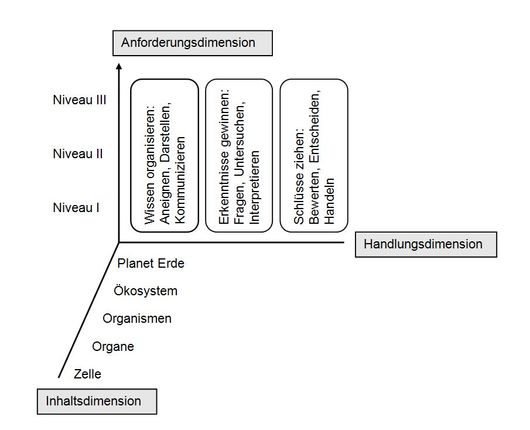
Prototypical examples illustrate the competencies in the natural science subjects Biology, Physics, and Chemistry that students are expected to acquire throughout lower secondary education (Sekundarstufe I). These tasks are available to teachers in both digital format and as editable Word documents.
The tasks, developed with contributions from MMag. Dr. Iris Schiffl and Assoc. Prof. Hubert Weiglhofer, can be accessed via the BIFIE website.
Health Promotion
Lead: Priv.-Doz. MMag. Dr. Iris Schiffl
Health promotion is of central importance within the school setting as a place of work, learning, and life. Both the teaching of health-related knowledge and skills as well as the school environment itself are subjects of research and development in subject didactics. The following questions are of particular relevance:
- Which factors need to be considered in health promotion (physical, psychological, social, structural)?
- Which theoretical frameworks are suitable for structuring and explaining this field (biomedical, social science models)?
- How should materials and processes for health promotion be designed in school and non-school contexts?
- What effects can be expected from interventions, and how can they be measured?
Sex Education Research in Biology Teaching
The goal of sex education interventions, beyond the prevention of sexual abuse, is to foster a self-determined and responsible approach to one’s own body and sexuality. A comprehensive approach to sexuality education aims to address and critically reflect on diverse values, attitudes, norms, and discriminatory behaviors. It also includes an important focus on the representation of sexuality in the media, addressing students’ insecurities and challenges and creating space for open discussion.
These goals cannot be achieved solely through the teaching of biological or anatomical knowledge. Rather, students need holistic guidance. It is essential to provide knowledge about the diversity of bodies, gender identities, sexual orientations, as well as emotions and how to deal with them. This is supported through the strengthening of body awareness, the ability to experience pleasure, and by promoting health-consciousness in relation to sexuality.
The implementation of these topics in biology lessons is part of the course “Sexual Education and Health Promotion” and can also be addressed in Bachelor theses. The course is based on the international standards for sexuality education (WHO & BZgA, 2011) as well as the Austrian federal guidelines on sex education (Grundsatzerlass Sexualpädagogik, BMBF, 2015).
References:
BMBF (2015). Grundsatzerlass Sexualpädagogik. Circular No. 11/2015. Vienna: BMBF. WHO & BZgA (World Health Organization, German Federal Centre for Health Education). (2011). Standards for Sexuality Education in Europe: A Framework for Policy Makers, Educational and Health Authorities and Specialists. Cologne: BZgA.
Educational Lab
Love – Friendship – Sexuality
Interdisciplinary and Cross-Institutional Thematic Module and Educational Lab You can find more information about the project here >>
2009-2011
Youth–Future 2009
Project Lead: Ao.Univ.Prof. Mag. Dr. Ulrike Unterbruner
This international study examined the future visions of Austrian and German (Berlin) students aged 13 to 17. Dr. Kathrin Otrel-Cass contributed to the project with a parallel study involving young people in New Zealand.
The study replicates earlier research conducted in 1989/90 with Austrian adolescents (Unterbruner 1989, 1991). The results show that young people still exhibit a high level of sensitivity toward environmental issues, and nature continues to hold a significant place in their visions of the future.
This is reflected in their expressed desire for a healthy, green environment and environmental protection, as well as in the frequently mentioned fears about ongoing environmental destruction. The role of technology in shaping the future is seen as ambivalent, but is viewed more positively than it was 20 years ago.
Further reading:
- Unterbruner, U. (2011). Stories from the Future. How Young People Imagine Nature, Technology, and Humanity 20 Years from Now. Munich: oekom-Verlag.
- Unterbruner, U. (2009). The World in 20 Years: Results of a Study with Austrian and Berlin Adolescents. In: umwelt & bildung, 4, pp. 8–11.
- Unterbruner, U. & Otrel-Cass, K. (2010). How Young People Imagine Technology and New Media in a World 20 Years from Now: Results of the “Youth–Future 2008/09” Study with Adolescents from Austria, Germany, and New Zealand. In: Zumbach, J. & Maresch, G. (Eds.). Current Developments in Science Education Didactics: Approaches from Biology and Computer Science. Innsbruck: StudienVerlag.
2010
Flood Control – A Computer-Based Simulation Game on Riparian Forests for 9th Grade Students
One module of features a simulation game focused on flood risks and strategies for the conservation of riparian forests. The project was developed with financial support from the Upper Austrian Academy for the Environment and Nature. Project Leads: Ao.Univ.Prof. Mag. Dr. Georg Pfligersdorffer, Ao.Univ.-Prof. Dr. Ulrike Unterbruner
Content:
The town of Wasserstätten on the Danube is repeatedly struck by severe flooding. Action must be taken! The town council convenes and must choose one of three proposed solution models—each aiming to best reconcile the needs and desires of various community stakeholders with the preservation of nature in the affected areas.
The Game:
Students take on the roles of local government representatives, affected residents, tourism stakeholders, members of the “Save the Forest” initiative, ecologists, and others. They must present convincing arguments in favor of their preferred solution.The goal is to reach a compromise in the spirit of sustainable development, taking into account ecological, economic, and social aspects. The decisions made are entered into the computer, which provides feedback on the consequences and suggests further action options. The simulation is freely available for educational purposes!
Further reading: Pfligersdorffer, G. (2010). The Simulation Game “Flood Control”: A Contribution to the Development of Systemic Competencies. In: Zumbach, J. & Maresch, G. (Eds.): Current Developments in Research on Teaching and Learning in Subject Didactics: Approaches and Examples from Computer Science and Biology. Innsbruck: StudienVerlag.
2005-2010
Production of Audiovisual Media
In seminars and courses, students are introduced to the design, application, research, and analysis of media in the field of education. They learn media theory fundamentals as well as practical skills in film production. The aim is to present scientific concepts clearly and engagingly through educational films and research documentaries, as well as to create and produce audiovisual media.
List of Film Productions since 2007:
The Diploma Examination
A video documenting the procedure of a diploma examination, offering students valuable tips for successfully preparing for this crucial final exam. Camera and editing: Franz Herzog Project team: Karin Haider, Birgit Reisenhofer, Hubert Weiglhofer, Jörg Zumbach Salzburg Science Film / Department of Subject Didactics – Teacher Education (IDN), 23 min. © 2010
Sparkling Science – Scientists and Schools Research the International Polar Year
The aim of the film is to foster young scientific talent and, above all, to inspire enthusiasm for research. Specifically, the Sparkling Science program offers students a fantastic opportunity to collaborate with scientists on real research projects.
On the occasion of the International Polar Year, the film focuses on polar and climate research. Filming locations include the students’ research activities on the Pasterze Glacier – Austria’s longest glacier – as well as ice thickness measurements on the Dachstein plateau and the work of Austrian polar and climate researchers at a research station in northeast Greenland.
Two student groups even produced a short feature film and a documentary exploring public perceptions of the topic of climate change. Camera and direction: Franz Herzog
Salzburg Science Film / Department of Subject Didactics – Teacher Education, 45 min. © 2010, commissioned by the Austrian Federal Ministry of Science and Research (bm:wf)
Dance of Cultures
This film series on intercultural learning (14 episodes) aims to bring foreign cultures and the cultural diversity of our planet closer to the audience. Camera and direction: Franz Herzog Salzburg Science Film / Department of Subject Didactics – Teacher Education, 65 min. © 2009
Gelede
he film documents “Gelede,” a dance ritual of the Yoruba, an ethnic group from Benin. It is performed in honor of femininity personified as Iya Nla, especially motherhood, female ancestors, and elderly women. The festival likely originated in the 16th century.
During Gelede, men wear carved headpieces and costumes portraying both male and female figures, and perform dances accompanied by singing and drumming that reflect gender roles. The ritual not only honors femininity but also serves to appease its potentially destructive powers.
In 2001, Gelede was designated by UNESCO as a Masterpiece of the Oral and Intangible Heritage of Humanity.
Camera and direction: Franz Herzog Salzburg Science Film / Department of Subject Didactics – Teacher Education, 25 min. © 2008
Ice Climbing in Antarctica
This film shows penguins climbing seemingly insurmountable icebergs against the breathtaking backdrop of Antarctica—using nothing but their clawed feet and astonishing agility. Wrapped in a humorous narrative, the film offers informative insights into the behavior and lifestyle of these extraordinary animals.
Camera and direction: Franz Herzog Salzburg Science Film / Department of Subject Didactics – Teacher Education, 19 min. © 2007
National and International Awards for Media Productions
Together with the team from the Central Service Unit for Flexible Learning and New Media (ZFL), Franz Herzog won the Medidaprix 2005 for University Development with Digital Media, Europe’s largest media award.
For his DVD series including the films “The Colors of the Desert”, “From the Depths of the Earth”, and “Dance of the Senses”, Franz Herzog received the Comenius Medal 2004 from the GPI (Society for Pedagogy and Information).
2009
Environmental Education
Environmental education has been a key focus of biology education research for many years. Questions surrounding how environmental knowledge, environmental awareness, and environmentally responsible behavior can be promoted in both formal and non-formal education are explored in various research and development projects, as well as in the training and continuing education of teachers.
Notable contributions to the field of environmental education include projects such as Youth-Future 2009, , Flood Control, Experiencing Nature, Fish Banks, and UMILE. Additionally, topics such as environmental education, young people’s fears regarding environmental degradation, and the ecological knowledge of school graduates have been investigated.
Biology Field Trip Didactics
Field Trips Foster Nature Experience
In a time of increasing alienation from nature and ongoing environmental destruction, excursions and educational outings offer students new ways to connect with the living world. At the same time, many teachers are hesitant to take on the complex subject-specific demands involved in “leading through nature.”
In contrast, the constructivist approach “Exploring Nature Together” offers a different perspective. Based on carefully designed problem-oriented tasks, teachers and students collaboratively investigate natural phenomena. Nature experience games, such as those developed by Joseph Cornell, also provide especially intense experiences and new emotional pathways to nature. A collection of tried and tested nature experience activities can be found on our website under “Bio for Kids & Teens.”
Excursion to the Zoo
Students’ independent work is often hindered by the lack of small but crucial hints at key problem-solving moments. A tip for how to proceed, a visual representation of the problem, or additional information can support student groups through the use of “scaffolded learning aids.”
An exemplary implementation of this teaching concept was carried out during a field trip to Salzburg Zoo.
More on this in: Ehrenecker, A.; Pfligersdorffer, G. (2009). Problem-Oriented Teaching at the Zoo. Using PDAs and Keys for Internal Differentiation. In: Unterricht Biologie, Issue 347/348, pp. 73–77.
2008
Project Leads: Ao.Univ.-Prof. Dr. Ulrike Unterbruner, Ao.Univ.-Prof. Dr. Georg Pfligersdorffer; Mag. Leonhard Küllinger / Europagymnasium Baumgartenberg
is a project of the Interfaculty Department for Subject Didactics – Teacher Education at the University of Salzburg, in cooperation with the Upper Austrian Academy for the Environment and Nature (Oö. Akademie für Umwelt und Natur).
As part of this project, eight modules on ecological topics were developed for the Moodle e-learning platform at the department. These modules were extensively evaluated in a scientific study involving 21 school classes during the summer semester of 2007.
The Danube wetlands in the Upper Austrian region of Machland serve as a starting point for an in-depth exploration of basic ecological principles in the 6th grade of academic secondary school (AHS, i.e., 10th grade). Using this rich and sensitive habitat as a case study, students are encouraged and empowered to engage with issues surrounding the design and preservation of natural environments.
The content includes knowledge about habitat formation and conservation, ecological interrelationships, population dynamics, biomonitoring, and the tensions between ecology and economy. All of this is intended to serve as a practical “toolbox” to support informed decision-making about the protection and development of Europe’s remaining “jungles.”
The modules, freely available to teachers at www.naturelearn.at, follow a problem-based learning structure. Students are presented with questions and challenges designed to spark curiosity, promote independent learning, and encourage meaningful engagement with ecological issues.
In 2008, was awarded the Comenius Medal by the Society for Pedagogy and Information (GPI, Berlin) as part of the international eduMedia competition.
Further Reading:
-
Unterbruner, U., Pfligersdorffer, G. & Zumbach, J. (2008). In: Teaching and Learning Research in Biology Education, Vol. 3. Innsbruck: StudienVerlag, pp. 199–215. (naturelearn_2008.pdf)
-
Unterbruner, U. & Pfligersdorffer, G. (2007). Problem-Based Learning in Biology Education: Experiences from Schools and Teacher Training. In: Zumbach, J., Weber, A. & Olsowski, G. (Eds.). Problem-Based Learning: Concepts, Tools, and Case Studies from the German-Speaking World. Bern: h.e.p. Verlag AG, pp. 117–130.
2005
Experiencing Nature. New Insights from Research & Practice on Nature-Based Learning
In March 2004, the Institute for Science Education (IDN) and FORUM Environmental Education (Vienna) invited representatives from academia and educational practice to an international conference. The aim was to take time for a critical reflection on nature experience pedagogy and to foster a lively exchange of ideas and experiences. The resulting publication summarizes key positions and discussions from the conference:
Unterbruner, U. & FORUM Environmental Education (Eds.). (2005). Experiencing Nature: New Insights from Research & Practice on Nature-Based Learning. Innsbruck: StudienVerlag.
Computers in Biology Education
The internet, e-learning platforms, CD-ROMs, and other multimedia software have become increasingly common in biology classes. As new carriers of information, these media have ended the information monopoly once held by textbooks and teachers. New communication and learning tools expand the boundaries of the classroom and can make lessons more engaging and effective for students.
In subject didactics research, the use of computers is being evaluated in diverse contexts to assess their added value for biology education. One such initiative is the development of the online course on ecology, hosted on the Moodle learning platform. This program has been used in numerous classrooms, evaluated for its learning impact, and further developed in university courses for teacher trainees.
Computer simulations and educational games can offer valuable learning experiences. They help visualize complex processes and make the interconnections within systems more transparent. Through the use of such software, students can explore biological and ecological topics—from simple population dynamics to complex developmental models.
In didactics courses, future teachers become familiar with innovative approaches that integrate computer programs into biology education while promoting new forms of social interaction. Notable examples include concept mapping, model building, jigsaw classroom techniques, web quests, and tools like Hot Potatoes.
Further Reading:
-
-
Pfligersdorffer, G. (2005). The Development of a Multimedia CD-ROM on “Supermarket Biology”. “Challenge idea” and a constructivist setting. In: Radits, F./Rauch, F./Kattmann, U. (Eds.): Researching Together – Learning Together. Knowledge, Education and Sustainable Development. Innsbruck: StudienVerlag, pp. 171–196.
-
Pfligersdorffer, G. (2002). How Students Experience the Simulation Game “Fish Banks”: Between Complex Dynamics and an Ecological-Social Dilemma. In: Journal of Science Education, Vol. 8, pp. 103–118.
-
Pfligersdorffer, G. (2010). The Simulation Game “Flood Control”: A Contribution to the Development of Systemic Competencies. In: Zumbach, J./Maresch, G. (Eds.): Recent Developments in Subject Didactics Research: Approaches and Examples from Computer Science and Biology. Innsbruck: StudienVerlag.
-
Pfligersdorffer, G./Unterbruner, U./Dall, B./Maringer, A./Spitzer, D. (2008). “Flood Control” – A Computer-Based Simulation Game on Riparian Forests. Course 8: Who Benefits from a Nature (Protection) Reserve? In: Unterbruner, U./Pfligersdorffer, G. (Eds.): IFFB Subject Didactics – Teacher Education, University of Salzburg.
-
Unterbruner, U./Pfligersdorffer, G. (Eds.) (2007). IFFB Subject Didactics – Teacher Education, University of Salzburg.
-
Unterbruner, U. (2007). Multimedia Learning and Cognitive Load. In: Krüger, D./Vogt, H. (Eds.): Theories in Biology Education Research. A Handbook for Teacher Students and Doctoral Candidates. Berlin – Heidelberg: Springer, pp. 153–164.
-
2001-2011
Development and Evaluation of Learning Software
Research Project: “Development and Evaluation of Multimedia Learning Tools for Biology Education”
Project Lead: Ao.Univ.Prof. Mag. Dr. Ulrike Unterbruner
Multimedia, interactive programs on forest ecology and insects were developed for children and adolescents aged 9 to 13. These programs are based on recent findings in educational psychology and biology didactics and are informed by multimedia learning research. They feature an appealing sequence of information, processing, and testing pages.
The prototypes for the CD-ROMs “Forest Adventure” and “Squirrel, Wolf & Co” were evaluated with the target age group. Particular focus was placed on the learning processes during the use of the software and the influence of interactive design elements on learning outcomes. This research project was supported by the Anniversary Fund of the Austrian National Bank.
The most recent learning program, “Between Raincloud and Tap”, was developed in a collaboration between geology and biology education. It targets young people aged 10 to 15 and addresses the geological core concepts of groundwater, springs, and public water supply systems.
Project partners: – Dr. Gernot Unterbruner, University of Teacher Education Salzburg – Mag. Martin Seibt, MSc., Aktion Film Salzburg – Prof. Dr. Ulrich Kattmann, University of Oldenburg – Mag. Dr. Sylke Hilberg, Department of Geography & Geology, University of Salzburg
To date, five “leisure-friendly” CD-ROMs have been developed, all of which can be used in a variety of ways in educational settings. The CD-ROMs have received multiple awards.
- Forest Adventure (2001) State Prize for Multimedia and eBusiness 2001 – Jury Distinction in “Knowledge and eLearning” Comenius Seal 2004
- Squirrel, Wolf & Co. – Forest Adventure 2 (2004) State Prize for Multimedia and eBusiness 2004 – Jury Distinction in “Knowledge and eLearning” Comenius Seal 2004
- Butterflies, Beetles & Co. – Little Creatures Adventure 1 (2007) Comenius Seal 2008
- Bees, Aphids & Co. – Little Creatures Adventure 2 (2008) Comenius Seal 2009
- Between Raincloud and Tap (2012) Comenius Seal 2013
Publications
- Unterbruner, U., Unterbruner, G. (2005): The Effect of Multimedia Program Design That Supports Processing on the Learning Processes of 10- to 12-Year-Olds. In: Klee, R., Sandmann, A., Vogt, H. (Eds.): Teaching and Learning Research in Biology Education, Vol. 2. StudienVerlag, Innsbruck, Vienna, Bolzano.
- Unterbruner, U. (2004): Adventures in the Forest – Virtual and Real. In: Unterricht Biologie, Issue 293, pp. 15–19.
- Unterbruner, U., Unterbruner, G. (2002): Multimedia in Ecology Education: Learning Processes and Program Design. In: Klee, R., Bayrhuber, H. (Eds.): Teaching and Learning Research in Biology Education, Vol. 1. StudienVerlag, Innsbruck, pp. 187–198. (PDF: unterbruner-unterbruner_2005.pdf)
- Unterbruner, U. (2001): Multimedia in Ecology Education. In: Bayrhuber, H. et al. (Eds.): Life Sciences in Schools and Public Discourse, pp. 86–89.
Experimental School Biology
Former Head: Ao.Univ.Prof.Mag.Dr. Georg Pfligersdorffer
xperiments in biology classes aim to make natural phenomena “question-worthy” and to gain insights into them using scientific methods and procedures. Their educational value is exceptionally high and multifaceted: students gain an understanding of the thinking and working methods of modern biology, acquire authentic knowledge about the structure and function of living matter, and recognize the relationships between organisms and their environment.
Independent student work and the manual as well as conceptual involvement in experimental exploration of subject matter significantly contribute to the development and maturity of young learners.
In our offered courses, school experiments are implemented following our “K3 Concept.” K3 stands for:
- Keller (basement)
- Kuchl (kitchen)
- Kabinett (classroom/lab)
…meaning: use of simple materials, non-hazardous substances, and feasible implementation by students themselves — true to the Austrian spirit 😉

2002
Fish Banks – Complexity and Eco-Social Dilemmas
The computer-supported simulation game Fish Banks (Meadows 1993) offers students new learning experiences in dealing with eco-social dilemmas and complex dynamic systems. Through the tangible and playful exploration of such phenomena, the root causes of environmental problems can be better understood, and the often inadequate behaviors of humans in response to them can be critically reflected upon.
Further reading: Pfligersdorffer, G. (2002). How Students Experience the Simulation Game “Fish Banks”: Between Complex Dynamics and an Eco-Social Dilemma. In: Journal of Science Education Didactics, Vol. 8, pp. 103–118. (ftp://ftp.ipn.uni-kiel.de/pub/zfdn/2002/S.103-118_Pfligersdorffer_2002.pdf)
2000–2005
UMILE – Environmental Education in Teacher Training
UMILE Team, University of Salzburg: Ao.Univ.-Prof. Dr. Ulrike Unterbruner, Ao.Univ.-Prof. Dr. Georg Pfligersdorffer
As part of the nationwide Austrian FWF project UMILE – Environmental Education in Teacher Training (Project Lead: Prof. Peter Posch, University of Klagenfurt), a new practice-oriented course format—the “Interdisciplinary Project”—was developed and evaluated for biology teacher education at the University of Salzburg.
Further reading:
- Pfligersdorffer, G. / Unterbruner, U. (2000). Experiencing, Exploring, and Teaching Riparian Forests: An Interdisciplinary Project in Teacher Education. In: Posch, P. / Rauch, F. / Kreis, I. (Eds.): Education for Sustainability. Studies on Networking in Teacher Education, Schools, and the Environment. Innsbruck: StudienVerlag, pp. 99–120.
- Unterbruner, U. / Pfligersdorffer, G. (2000). Innovative Aspects of Biology Teacher Education: “Interdisciplinary Projects” Through the Lens of Evaluation. In: Bayerhuber, H. / Unterbruner, U. (Eds.): Teaching and Learning in Biology Education. Innsbruck: StudienVerlag, pp. 195–209. (UMILE_unterbruner-pfligers.pdf)
- Pfligersdorffer, G. (2005). The Development of a Multimedia CD-ROM on “Supermarket Biology”: The “Challenge Idea” and a Constructivist Setting. In: Radits, F. / Rauch, F. / Kattmann, U. (Eds.): Researching Together – Learning Together. Knowledge, Education, and Sustainable Development. Innsbruck: StudienVerlag, pp. 171–196.
1991
Ecological Knowledge of School Graduates
Project Lead: Ao.Univ.Prof. Mag. Dr. Georg Pfligersdorffer
To what extent ecological topics and environmental education are truly integrated and taught within the Austrian school system was the focus of an extensive study. All graduates from Salzburg’s academic secondary schools (AHS) and vocational secondary schools (BHS) were surveyed regarding their ecological knowledge.
The results revealed that students’ knowledge was fragmented, abstract, and theoretical, with little conceptual depth. Furthermore, an analysis of national curricula showed that ecological and environmental topics were significantly underrepresented—particularly in technical vocational schools (BHS with a technical focus).
Further reading: Pfligersdorffer, G. (1991). The State of Biological and Ecological Education Among School Graduates: An Empirical Study on Students’ Knowledge and Curriculum Frameworks in Upper Secondary Education (AHS, BHS, and BMS) in Austria. ABAKUS-Verlag, Salzburg.
Environmental Education and Adolescents’ Fears of Environmental Destruction
Project Lead: Ao.Univ.Prof. Mag. Dr. Ulrike Unterbruner
Research findings show that young people display a high level of sensitivity toward environmental issues. Many of them express fears related to environmental destruction, along with a longing for an intact, green world.
It is crucial to integrate these emotional components into environmental education. Otherwise, such (threatening) emotions may become obstacles to engaging meaningfully with nature and environmental topics. Suitable methods include creative painting and writing, role-playing, discussion circles, and more.
Environmental education should be holistic and action-oriented, incorporating a wide variety of topics and teaching methods.
Further reading:
- Unterbruner, U. (1991). Environmental Anxiety – Environmental Education: Proposals for Addressing Adolescents’ Fears of Environmental Destruction. Linz: Veritas.
- Unterbruner, U. (1999). Adolescents’ Environmental Fears and Consequences for Environmental Education. In: Kaufmann-Hayos, R., Künzli, Ch. (Eds.): “… you can’t just opt out.” Children and Adolescents Between Environmental Anxiety and Consumerism. Vdf – University Press at ETH Zurich, pp. 153–174.
- Boehnke, K., Frindte, W., Hamilton, S.B., Melnikov, A.V., Reddy, N.Y., Singhal, S., Solantaus, T., Unterbruner, U. (1992). Macrosocial Concerns and Ethno-Cultural Stereotypes in Cross-Cultural Comparison. In: Mansel, J. (Ed.): Adolescents’ Responses to Societal Threats. Weinheim–Munich: Juventa, pp. 80–92.

